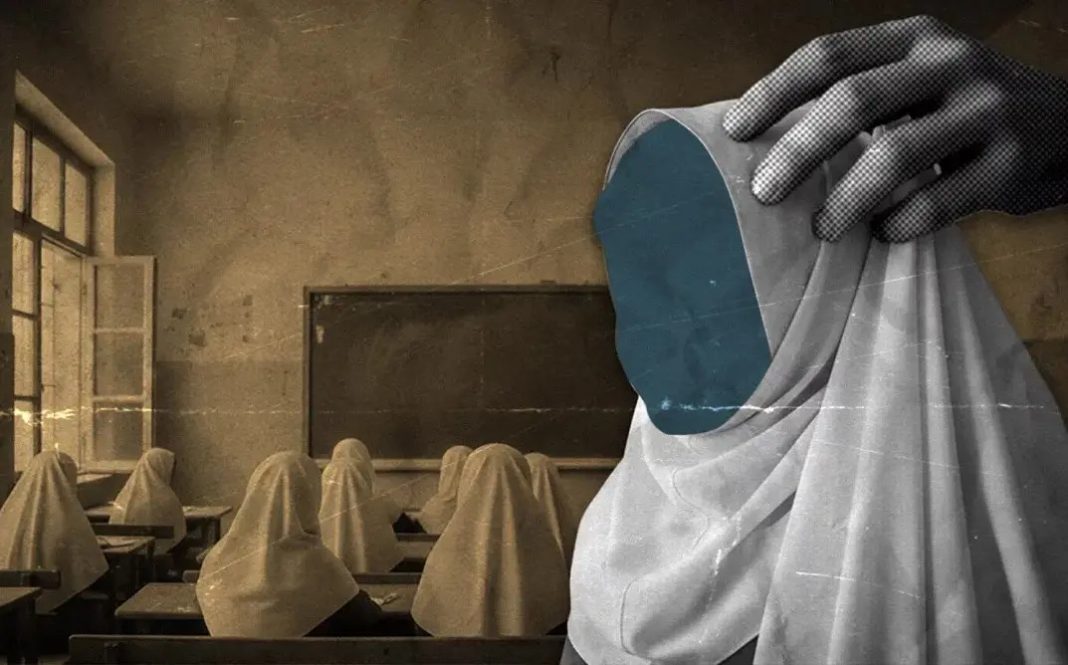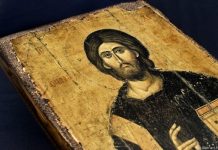في اطار اضطهاد المسيحيين الأقباط في مصر/في مصر فتاة مسيحية تتعرض للمضايقة لرفضها الحجاب – “نظروا إليّ وكأنني عارية”
د. ريموند إبراهيم/نقلاً عن موقع التضامن القبطي/07 تشرين الثاني/2025
(ترجمة من الإنكليزية بتصرف بواسطة الياس بجاني بالإستعانة بمواقع ترجمة ألكترونية)
Christian Girl Harassed In Egypt for Refusing Hijab — “They Looked at Me as if I Were Naked”
Dr. Raymond Ibrahim/Coptic Solidarity/November 07/2025
On her first day at a public high school in the Egyptian province of Minya, Maryam walked in like every girl in the West does—with her hair uncovered. Unlike in the West, she was immediately confronted by the school principal, who scolded her before the other students: “You can’t come with your hair like that,” the principal barked. “It’s shameful! You must come tomorrow wearing a head scarf.”
Maryam was taken aback. “I told her that I’m Christian and not required to wear the hijab,” she later recalled, “but she insisted that this was the rule, and that I was causing fitna [sedition] by refusing.”When Maryam returned to school the next morning still bare-headed, the atmosphere was hostile. “Everyone was shocked and looked at me as if I were naked,” said the determined teen. “Some girls giggled; others whispered insults like kafira [infidel]. One of the teachers told me, ‘You Christians always want to show off your bodies.’”
The harassment did not end there. Other teachers began to single her out in class, calling her “arrogant” and “rebellious.” Several Muslim classmates refused to sit beside her. “It was as if I had committed a crime,” Maryam said. “They treated me like I was dirty — just because I didn’t cover my hair.”Even outside school, the pressure intensified. Some of Maryam’s relatives — themselves weary of constant discrimination — urged her to comply “for your own safety.” But she refused to bend. “I feel like I’m getting into a fight defending my freedom,” she said. “I want to be myself. I’m not Muslim. Why should I wear the hijab?”Maryam dreams of attending university “with my hair spread over my shoulders, without anyone looking at me as if I’ve done something wrong.” But in Egypt today, this “dream” requires courage bordering on defiance.
Though the hijab is not legally mandated in Egypt, Islamic norms dominate public life, especially in provincial towns. Officially, Egypt’s constitution promises “freedom of religion,” yet the state’s education system —overseen by a powerful Islamic stronghold in the Ministry of Education— enforces a de facto Islamic culture in public schools. Coptic girls are often told to cover their hair; Christian boys are mocked for not memorizing Koran verses as part of Arabic language courses; and Christian teachers risk dismissal if they complain. Such incidents have multiplied in recent years, part of the ongoing Islamization program of the nation. Under the presidency of Abdel Fattah el-Sisi, Egypt officially presents itself as a bulwark against “extremism”; meanwhile, the everyday experience of Christians tells another story: mosques proliferate while church construction faces severe bureaucratic obstruction; sermons and textbooks glorify Islam while ignoring or vilifying Christianity; and even clothing has become a political statement of submission or defiance.
Now it’s hair. Maryam’s experience thus reveals not an isolated misunderstanding, but a symptom of a much broader reality: in today’s Egypt, to be visibly Christian is to invite persecution. What begins as “advice” to wear the veil can quickly escalate to ostracism, threats, and even violence — all justified under the guise of “conformity” and “social harmony.”Incidentally, it is no coincidence that Minya, Maryam’s home province, is also one of Egypt’s most intolerant regions. Churches there are routinely attacked or closed; Christian girls are abducted and forcibly converted; and the police, when not complicit, are indifferent. In this climate, a 16-year-old girl insisting on the right to leave her hair uncovered becomes an act of “rebellion” — a stand against the coercive weight of an entire Islamized culture. “I just want to study and live like anyone else,” Maryam said; “but I don’t want to be forced to pretend to be something I’m not.”Her simple plea — for dignity, conscience, and freedom — speaks volumes about the fate of Egypt’s Christians today. Once again, the “land of the Nile” shows that its most ancient and indigenous people, the Copts, remain strangers in their own homeland.
https://www.raymondibrahim.com/11/6/2025/articles-of-the-day
في اطار اضطهاد المسيحيين الأقباط في مصر/في مصر فتاة مسيحية تتعرض للمضايقة لرفضها الحجاب – “نظروا إليّ وكأنني عارية”
د. ريموند إبراهيم/نقلاً عن موقع التضامن القبطي/07 تشرين الثاني/2025
(ترجمة من الإنكليزية بتصرف بواسطة الياس بجاني بالإستعانة بمواقع ترجمة ألكترونية)
في يومها الأول في مدرسة ثانوية حكومية بمحافظة المنيا المصرية، دخلت مريم كأي فتاة في الغرب – بشعرها مكشوف. على عكس الغرب، واجهتها مديرة المدرسة على الفور ووبختها أمام الطالبات الأخريات: “لا يمكنكِ أن تأتي وشعركِ هكذا،” صرخت المديرة. “هذا عيب! يجب أن تأتي غدًا وأنتِ ترتدين غطاء الرأس.”
صُدمت مريم. وتذكرت لاحقاً: “أخبرتها أنني مسيحية ولست مطالبة بارتداء الحجاب، لكنها أصرت على أن هذه هي القاعدة، وأنني أتسبب في فتنة [فتنة دينية أو اضطراب] برفض ذلك.” عندما عادت مريم إلى المدرسة في صباح اليوم التالي وهي ما تزال مكشوفة الرأس، كان الجو عدائياً. قالت المراهقة المصممة: “الجميع صُدموا ونظروا إليّ وكأنني عارية. بعض الفتيات كن يتهامسن ويضحكن؛ وبعضهن يتهامسن إهانات مثل كافرة. إحدى المعلمات قالت لي: ‘أنتم أيها المسيحيون تريدون دائمًا التباهي بأجسادكم’.”
لم تنتهِ المضايقات هنا. بدأ معلمون آخرون في تمييزها في الصف، واصفين إياها بـ “المتعجرفة” و “المتمردة”. ورفضت عدة زميلات مسلمات الجلوس بجانبها. قالت مريم: “كان الأمر وكأنني ارتكبت جريمة. لقد عاملوني وكأنني قذرة – لمجرد أنني لم أغطِ شعري.”
حتى خارج المدرسة، اشتد الضغط. حثها بعض أقارب مريم – الذين سئموا هم أنفسهم من التمييز المستمر – على الامتثال “من أجل سلامتك الخاصة.” لكنها رفضت الانصياع. قالت: “أشعر وكأنني أدخل في معركة للدفاع عن حريتي. أريد أن أكون على طبيعتي. أنا لست مسلمة. لماذا يجب أن أرتدي الحجاب؟”
تحلم مريم بالالتحاق بالجامعة “وشعري منسدل على كتفي، دون أن ينظر إليّ أحد وكأنني ارتكبت خطأ.” لكن في مصر اليوم، يتطلب هذا “الحلم” شجاعة تصل إلى حد التحدي.
أسلمة الحياة العامة في المدارس المصرية
رغم أن الحجاب ليس إلزامياً قانونياً في مصر، إلا أن الأعراف الإسلامية تهيمن على الحياة العامة، خاصة في مدن المحافظات. رسمياً، يَعِد الدستور المصري بـ “حرية الدين”، لكن نظام التعليم في الدولة – الذي يشرف عليه معقل إسلامي قوي في وزارة التربية والتعليم – يفرض ثقافة إسلامية فعلية (بحكم الواقع) في المدارس الحكومية. غالباً ما يُطلب من الفتيات القبطيات تغطية شعورهن؛ ويُسخر من الأولاد المسيحيين لعدم حفظهم آيات من القرآن كجزء من دورات اللغة العربية؛ ويخاطر المعلمون المسيحيون بالفصل إذا اشتكوا. وقد تضاعفت مثل هذه الحوادث في السنوات الأخيرة، كجزء من برنامج أسلمة الأمة المستمر.
في ظل رئاسة عبد الفتاح السيسي، تقدم مصر نفسها رسمياً كحصن ضد “التطرف”؛ وفي الوقت نفسه، فإن التجربة اليومية للمسيحيين تروي قصة أخرى: تنتشر المساجد بينما يواجه بناء الكنائس عراقيل بيروقراطية شديدة؛ وتمجد الخطب والكتب المدرسية الإسلام بينما تتجاهل أو تشوه المسيحية؛ وحتى الملابس أصبحت بياناً سياسياً للخضوع أو التحدي.
كونك مسيحياً ظاهراً دعوة للاضطهاد
الآن، الأمر يتعلق بالشعر. تكشف تجربة مريم بالتالي ليس عن سوء فهم معزول، بل عن عرض لواقع أوسع بكثير: في مصر اليوم، أن تكون مسيحياً ظاهراً هو دعوة للاضطهاد. ما يبدأ كـ “نصيحة” لارتداء الحجاب يمكن أن يتصاعد بسرعة إلى نبذ وتهديدات وحتى عنف – وكل ذلك يتم تبريره تحت ستار “الامتثال” و “الانسجام الاجتماعي.”
بالمناسبة، ليس من قبيل المصادفة أن المنيا، محافظة مريم، هي أيضاً واحدة من أكثر مناطق مصر تعصباً. تتعرض الكنائس هناك للهجوم أو الإغلاق بشكل روتيني؛ وتُختطف الفتيات المسيحيات ويُجبرن على التحول؛ والشرطة، إن لم تكن متواطئة، فهي غير مبالية. في هذا المناخ، تصبح إصرار فتاة تبلغ من العمر 16 عاماً على الحق في ترك شعرها مكشوفاً عملاً من أعمال “التمرد” – وقفة ضد الوزن القسري لثقافة بأكملها تم أسلمتها. قالت مريم: “أريد فقط أن أدرس وأعيش مثل أي شخص آخر، لكنني لا أريد أن أجبر على التظاهر بأنني شيء لست عليه.”
إن نداءها البسيط – من أجل الكرامة والضمير والحرية – يتحدث كثيراً عن مصير مسيحيي مصر اليوم. مرة أخرى، تُظهر “أرض النيل” أن شعبها الأكثر قدماً وأصالة، الأقباط، ما زالوا غرباء في وطنهم.
رابط المقال الأصلي: https://www.raymondibrahim.com/11/6/2025/articles-of-the-day



















